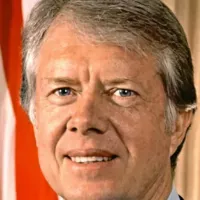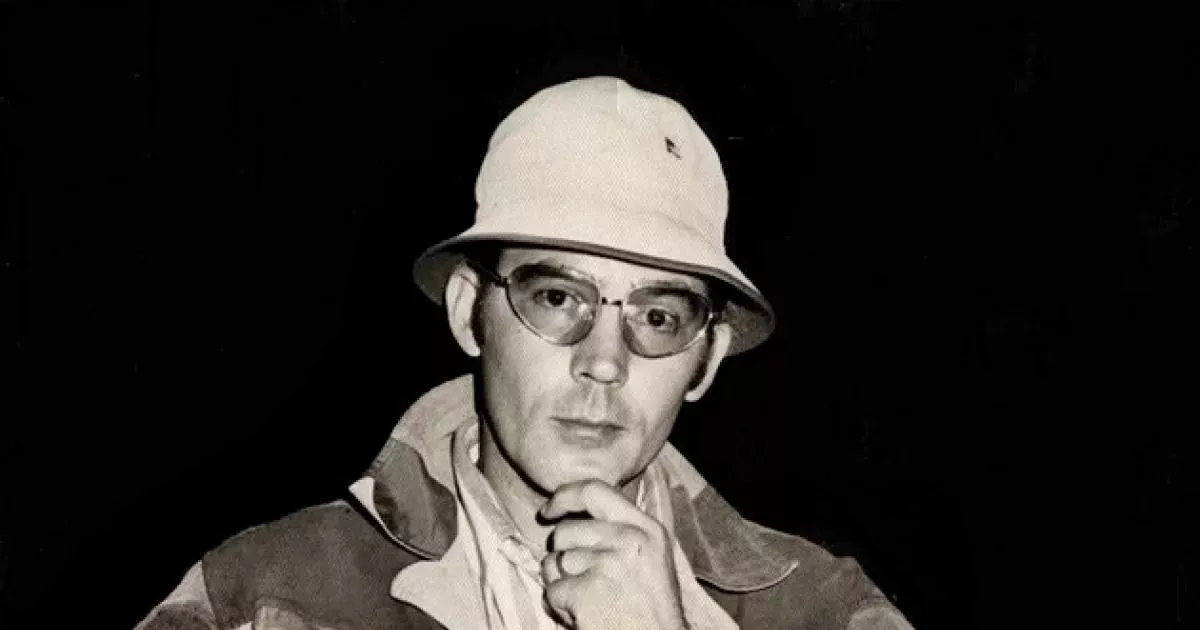Hunter S. Thompson, a key figure in New Journalism, gained recognition for his immersive reporting style. His book "Hell's Angels" (1967), documented a year spent living with the motorcycle club, providing a firsthand account of their lives. His 1970 article "The Kentucky Derby Is Decadent and Depraved" solidified his countercultural status and marked the beginning of "Gonzo" journalism. This unique style placed the writer as a central character within the narrative, blurring the lines between objective reporting and subjective experience. Thompson's work influenced a generation of journalists and cemented his place as a literary innovator.
September 1934: Meeting of Thompson's Parents
Thompson's parents were introduced in September 1934.
November 2, 1935: Marriage of Thompson's Parents
Thompson's parents married on November 2, 1935.
July 18, 1937: Birth of Hunter S. Thompson
Hunter S. Thompson was born on July 18, 1937.
December 1943: Thompson Family Moves to Cherokee Triangle
In December 1943, the Thompson family moved to the Cherokee Triangle neighborhood.
July 3, 1952: Death of Jack Robert Thompson
Thompson's father, Jack Robert Thompson, died on July 3, 1952.
1952: Thompson Joins Athenaeum Literary Association
Thompson became a member of the Athenaeum Literary Association in 1952.
1955: Thompson Expelled from Athenaeum, Enlists in Air Force
In 1955, Thompson was expelled from the Athenaeum Literary Association and subsequently enlisted in the United States Air Force.
1956: Thompson's Air Force Transfer and Studies
Thompson transferred to Eglin Air Force Base and began taking evening classes at Florida State University in 1956.
1957: Thompson's First Writing Job
Thompson secured his first professional writing job as sports editor for The Command Courier in 1957. He also wrote a sports column for The Playground News.
1958: Thompson's Honorable Discharge from Air Force
Thompson received an early honorable discharge from the Air Force in 1958.
1959: Thompson's Work in New York
Thompson worked briefly for Time magazine and later The Middletown Daily Record in 1959, getting fired from both.
1960: Thompson Moves to Puerto Rico
Thompson moved to San Juan, Puerto Rico, for a job with El Sportivo in 1960. He later worked as a stringer for various newspapers.
1965: Thompson's Political Views
In 1965, Hunter S. Thompson expressed his political leanings in letters to friends. He showed admiration for the Industrial Workers of the World (IWW), agreed with Karl Marx, and criticized the free enterprise system. He also expressed support for the civil rights movement and criticized "white power structures".
1967: Publication of "Hell's Angels"
In 1967, Hunter S. Thompson published "Hell's Angels," a book based on his year-long immersion with the motorcycle club.
1970: Publication of "The Kentucky Derby Is Decadent and Depraved"
Hunter S. Thompson's article "The Kentucky Derby Is Decadent and Depraved" was published in Scanlan's Monthly in 1970, marking a significant step in his Gonzo journalism style.
1972: Publication of "Fear and Loathing in Las Vegas"
"Fear and Loathing in Las Vegas" was published in 1972, initially as a series in Rolling Stone.
1972: Coverage of McGovern's Presidential Campaign
Thompson covered George McGovern's 1972 presidential campaign for Rolling Stone.
1973: Publication of "Fear and Loathing: On the Campaign Trail '72"
"Fear and Loathing: On the Campaign Trail '72," a compilation of Thompson's campaign coverage, was published in 1973.
1974: Playboy Interview and Gonzo Journalism
In a 1974 Playboy interview, Thompson discussed his Gonzo journalism style, differentiating it from traditional reporting.
1975: Vietnam War Coverage and Strained Relationship with Rolling Stone
In 1975, Hunter S. Thompson was sent to Vietnam by Rolling Stone to cover the end of the Vietnam War. His arrival coincided with the fall of South Vietnam. Thompson's relationship with Rolling Stone became strained, allegedly due to the cancellation of his medical insurance by Jann Wenner, although Wenner later disputed this claim. Thompson ultimately left Vietnam without filing a full report, promising to deliver it on the ten-year anniversary of the Fall of Saigon.
1976: Failed Presidential Campaign Coverage and Endorsement of Jimmy Carter
In 1976, Thompson's plans to cover the presidential campaign for Rolling Stone and publish a book were abandoned. Thompson claimed Wenner cancelled the project without notice, while Wenner cited concerns about Thompson's discipline and the subject matter. Thompson did, however, spend time with Jimmy Carter and wrote a cover story endorsing him.
1978: Fear and Loathing in Gonzovision
The documentary "Fear and Loathing in Gonzovision" aired on the BBC in 1978, featuring plans for Thompson's funeral monument.
1979: Publication of "The Great Shark Hunt"
In 1979, Hunter S. Thompson published "The Great Shark Hunt," the first volume of "The Gonzo Papers," a collection of his earlier works, including pieces from before his Gonzo period.
1979: Start of Compilation of "The Gonzo Papers"
Thompson's work from 1979 to 1994 was collected in "The Gonzo Papers."
1980: Divorce, Film Adaptation, and "The Curse of Lono"
1980 marked significant events for Thompson: his divorce from Sandra Conklin, the release of the film "Where the Buffalo Roam" starring Bill Murray, and his relocation to Hawaii to write "The Curse of Lono."
1980: First Film Adaptation of "Fear and Loathing in Las Vegas"
A loose film adaptation of Thompson's novel, "Where the Buffalo Roam," was released in 1980.
1980: Reduced Activity and Continued Role at Rolling Stone
Around 1980, Thompson's output decreased. He largely retreated to his Woody Creek compound, often declining or failing to complete projects. Despite this, he remained on the Rolling Stone masthead as chief of the "National Affairs Desk."
1981: Publication of "The Charge of the Weird Brigade"
In 1981, "The Charge of the Weird Brigade", an early version of "The Curse of Lono," was published in Running magazine.
1983: Playboy Excerpt of "The Curse of Lono"
"The Curse of Lono" was excerpted in Playboy magazine in 1983, after its initial publication in Running magazine in 1981. The book received poor reviews and disappointing sales.
1983: Coverage of Grenada Invasion and "A Dog Took My Place"
In 1983, Thompson covered the U.S. invasion of Grenada (an experience he wouldn't discuss publicly until 2003) and wrote "A Dog Took My Place" for Rolling Stone about the Roxanne Pulitzer divorce case and the "Palm Beach lifestyle."
1984: Rolling Stone Contributions Begin
In 1984, Hunter S. Thompson started contributing articles to Rolling Stone magazine, marking the beginning of a long-term relationship with the publication.
1985: Research on "Feminist Pornography" and "The Night Manager"
In 1985, Thompson began researching "feminist pornography" for Playboy, which led to his work on an unpublished novel titled "The Night Manager."
1988: Publication of "Gonzo Papers, Vol. 2: Generation of Swine"
In 1988, "Gonzo Papers, Vol. 2: Generation of Swine: Tales of Shame and Degradation in the '80s" was published, collecting many of Thompson's columns.
March 1990: Sexual Assault Charge and Trial
In March 1990, Thompson faced a sexual assault charge from Gail Palmer. He was tried for multiple felonies and misdemeanors, including drug abuse allegations following a police raid on his home. The charges were eventually dropped.
1990: Publication of "Gonzo Papers, Vol. 3: Songs of the Doomed"
1990 saw the publication of "Gonzo Papers, Vol. 3: Songs of the Doomed: More Notes on the Death of the American Dream," a collection of autobiographical material, articles, and previously unpublished work.
1992: Fear and Loathing in Elko and Political Commentary
Thompson published "Fear and Loathing in Elko" in 1992, a fictional piece criticizing the nomination of Clarence Thomas to the Supreme Court. He also covered the 1992 presidential campaign from a distance, observing through cable television and sharing his commentary via faxes to Rolling Stone, compiled in "Better Than Sex: Confessions of a Political Junkie".
1994: Publication of "Better Than Sex"
In 1994, "Better Than Sex", the final volume of Thompson's four-part "The Gonzo Papers" series, was released. This series served as a compilation of much of his previously published work.
1994: Richard Nixon Obituary
In 1994, Thompson wrote a "scathing" obituary for Richard Nixon titled "He Was a Crook", published in Rolling Stone.
1994: Excerpt of "Polo Is My Life" in Rolling Stone
In 1994, an excerpt from Thompson's then-in-progress novel, "Polo Is My Life," was published in Rolling Stone. This was considered his last substantial piece of feature writing for the magazine.
1994: End of Compilation of "The Gonzo Papers"
The collection of works for "The Gonzo Papers" concluded in 1994.
1996: Reissue of Fear and Loathing in Las Vegas
In 1996, Modern Library reissued Fear and Loathing in Las Vegas, along with some of Thompson's other works.
1996: Thompson's Description of "Polo Is My Life"
Thompson described his novel "Polo Is My Life" in 1996 as a book about "sex, drugs, and rock and roll," focusing on a sex theater manager who flees to the mountains and encounters further trouble.
1997: Drug Legalization Advocacy
In 1997, Thompson expressed his support for drug legalization in an interview, comparing the situation to Prohibition.
1997: Lisl Auman Sentenced
Lisl Auman was sentenced to life in prison in 1997 for the death of police officer Bruce VanderJagt.
March 20, 1998: Death of Virginia Davison Ray
Thompson's mother, Virginia Davison Ray, passed away on March 20, 1998.
1998: Second Film Adaptation of "Fear and Loathing in Las Vegas"
A more faithful film adaptation of "Fear and Loathing in Las Vegas" was released in 1998.
1999: Planned Release of "Polo Is My Life"
"Polo Is My Life" was scheduled for release by Random House in 1999, even receiving an ISBN, but the book was never published.
2000: "Hey, Rube" Column Begins
Thompson began writing his "Hey, Rube" column for ESPN.com's Page 2 in 2000.
April 23, 2003: Marriage to Anita Bejmuk
Thompson married his assistant, Anita Bejmuk, on April 23, 2003.
2003: Kingdom of Fear Publication
In 2003, Thompson published "Kingdom of Fear: Loathsome Secrets of a Star-Crossed Child in the Final Days of the American Century", promoted as his first memoir.
2003: Publication of "Kingdom of Fear"
Thompson's experiences covering the U.S. invasion of Grenada in 1983 were finally discussed publicly with the 2003 publication of "Kingdom of Fear."
June 2004: Vanity Fair Article on Lisl Auman Case
Thompson co-wrote an article in the June 2004 issue of Vanity Fair about the Lisl Auman case, advocating for her release.
November 2004: Final Magazine Feature
Thompson's final magazine feature, "The Fun-Hogs in the Passing Lane: Fear and Loathing, Campaign 2004", was published in Rolling Stone in November 2004. It was a short piece about the 2004 presidential election, where he endorsed John Kerry.
2004: Hey Rube: Blood Sport Book Release
A collection of Thompson's "Hey, Rube" columns was published as a book titled "Hey Rube: Blood Sport, the Bush Doctrine, and the Downward Spiral of Dumbness" in 2004.
2004: Thompson's View on Nixon and Bush-Cheney
In 2004, Hunter S. Thompson stated his disapproval of the Bush-Cheney administration, going so far as to say he would vote for Richard Nixon if he were running against them.
2004: Final Rolling Stone Contribution and Book Release
In 2004, Thompson published his final piece in Rolling Stone and released a collection of his "Hey, Rube" columns titled "Hey Rube: Blood Sport, the Bush Doctrine, and the Downward Spiral of Dumbness".
2004: Criterion Collection DVD Release
The Criterion Collection DVD release of "Fear and Loathing in Las Vegas" in 2004 included "Fear and Loathing on the Road to Hollywood" as a special feature, showing the plans for Thompson's funeral monument.
February 20, 2005: Death of Hunter S. Thompson
Hunter S. Thompson passed away on February 20, 2005.
March 2005: Lisl Auman Sentence Overturned
Lisl Auman's sentence was overturned by the Colorado Supreme Court in March 2005, shortly after Thompson's death.
August 20, 2005: Funeral and Cannonized Ashes
On August 20, 2005, Thompson's ashes were fired from a cannon at his private funeral at Owl Farm, accompanied by fireworks and music.
2005: Death of Hunter S. Thompson
Hunter S. Thompson died in 2005.
2022: Jann Wenner's Account of Thompson's Vietnam Assignment
In 2022, Jann Wenner offered his account of Thompson's 1975 Vietnam assignment. He disputed the claim of cancelling Thompson's insurance and described Thompson's time in Saigon as being preoccupied with evacuation plans. Wenner also mentioned Thompson's eventual submission of an unfinished dispatch and his subsequent trip to Bangkok.
2022: Wenner on Thompson's Drug Use
Jann Wenner discussed Thompson's struggles with drug abuse and his refusal of treatment in 2022, highlighting the impact on his talent.
Mentioned in this timeline
Puerto Rico is a self-governing Caribbean archipelago and island that...

Jimmy Carter the th U S President - was a...

John Kerry is an American politician and diplomat notable for...

Las Vegas Nevada's most populous city and the seat of...

News encompasses information about current events disseminated through various media...

Fireworks are pyrotechnic devices primarily utilized for entertainment and aesthetic...
Trending

21 minutes ago Peyton Stearns, Texas Longhorn, triumphs at ATX Open, securing second WTA title.

1 hour ago Tom Steyer's California plan faces criticism while he spends millions on governor's race.

1 hour ago Darius Garland Prepares for Clippers Debut Against Warriors After Trade

1 hour ago Mark Stoops Hired by Texas as Special Assistant to Steve Sarkisian

1 hour ago Tyus Jones Joins Denver Nuggets: Bolstering Depth Before Jazz Game.

3 days ago Katie Boulter faces Jasmine Paolini in WTA Merida Quarterfinals; Hon Prediction
Popular

Jesse Jackson is an American civil rights activist politician and...

Hillary Diane Rodham Clinton is a prominent American politician lawyer...

Jim Carrey is a Canadian-American actor and comedian celebrated for...

XXXTentacion born Jahseh Dwayne Ricardo Onfroy was a controversial yet...

Kashyap Pramod Patel is an American lawyer who became the...

Barack Obama the th U S President - was the...
